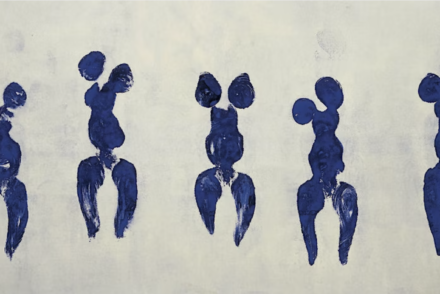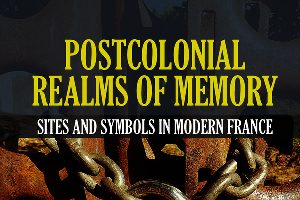Calls for Papers / Contributions
1.1 SFPS 2015 Conference: “Postcolonial Mobilities in the Francophone World.” Provisional Programme and Registration
1.2 L’expression de la parentalité dans les arts de la parole en Afrique
New Titles
2.1 Le Roman féminin francophone de la migration
2.2 Panafricanisme et postcolonialisme
2.3 Making Art in Africa, 1960-2010
Calls for Papers / Contributions
1.1 SFPS 2015 Conference: Programme and Registration
Society for Francophone Postcolonial Studies
In association with Liverpool University Press
Postcolonial Mobilities in the Francophone World
Friday 13 & Saturday 14 November 2015
Institute of Modern Languages Research, University of London,
Senate House, Malet Street, London WC1E 7HU
Confirmed keynote speakers: Mireille Rosello and Kate Averis
The large-scale movement of people, objects, capital and information has radically re-shaped the Francophone world in the 21st century. However, the same processes that promote movement and mobility also produce immobility, exclusion and disconnection. This conference will ask what potential does mobility beyond territorially fixed societies hold for the Francophone world. What are the implications of individualized and/or group mobility? What role does mobility play in relation to the creation of new transcultural and transnational identities? And, in turn, what challenges do new social and cultural practices pose for mobility rights and questions of ‘access’?
Registration for the conference is now open: SFPS 2015 – Registration Form
Provisional Programme
Friday 13 November 2014
9.30-10.15 Registration and welcome
10.15-10.30 Welcome
10.30-12.00 Panel 1: Parallel Sessions
Panel 1a: (Re)constructing Collective Histories
Kate Hodgson (Liverpool University), ‘Conciliate and Pacify’: Border-Crossing as a Physical and Textual Strategy of Reunification in Nineteenth Century Haiti’
Anneka Haddix (UCLA), ‘Retracing the Past in Le Village de l’Allemand ou le journal des frères Schiller’
Justin Izzo (Brown University), ‘Reading Benjamin in Djibouti: Abdourahman Waberi and the Theater of History’
Panel 1b: Creative Mobilities
Natalia Bremner (IMLR, University of London), ‘Reggae, Dancehall and CNARM: Youth Mobilities in Postcolonial Réunion’
Anne Mueller (UCLA), ‘Musical Mobility: Censorship and “Sanctionship” in Post-Genocide Rwanda’
Katie Tidmarsh (ULIP), ‘Moziki Littérature: Diffusion, Resistance and Memory on the internet’
12.00-2.00 Lunch/AGM
2.00-3.30 Panel 2: Parallel Sessions
Panel 2a: (Im)mobile Bodies
Jeanne Garane (University of South Carolina), ‘Freedom of Movement: The Magical Body in
Mahamat Saleh Haroun’s Grigris’
Linda Brindeau (Dickinson College), ‘La fluidité des identités sexuelles dans l’œuvre de Kettly Mars’
Adler Camilus (Université Paris 8), ‘Les frontières de la race, frontière de la domination et mobilité transfrontalière des corps’
Panel 2b: North African Mobilities
Aliénor Cadiot (EHESS-Paris), ‘Mobilités coloniales en temps de guerre entre l’Afrique du Nord francophone et la métropole’
Jamal Bahmad (University of Leeds), ‘De-centering Fortress Europe: Clandestine Migration and Maghrebi Cinema’s Critique of Globalisation’
Kayode Ayobami Atilade (Obafemi Awolowo University, Nigeria), ‘Globalisation and the Concept of Home in Tahar Ben Jelloun’s Novels’
3.30-4.00 Coffee/Tea
4.00-5.00 Panel 3: Parallel Sessions
Panel 3a: Rethinking French-Algerian Relations
Giulia Fabbiano (EHESS-Paris), ‘Postcolonial Mobility from France to Algeria: Narratives of Past, Practices of Present)
Laurie Benson (King’s College, London) ‘Re-imagining French-Algerian Relations: Art Practices, Institutions and the International’
Panel 3b: Fixity and Movement in the Caribbean
Nick Nesbitt (Princeton University), ‘The Misery of the Infinitesimal: Work and the promesse du bonheur in a Posthuman Caribbean’
Timwa Lipenga (University of Malawi), ‘En “fixant” le passé: La mobilité et la mémoire dans Victoire, Les Saveurs et Les Mots de Maryse Condé’
Shanaaz Mohammed (Florida State University), ‘(Im)mobility and the Mixed Race Female Identity in Arlette Minatchy-Bogat’s La Métisse Caribéenne’
5.00-6.00 Plenary Session: Kate Averis
6.00-7.00 Vin d’Honneur
7.30 Dinner
Saturday 14 November 2014
09.30-11.00 Panel 4: Parallel Sessions
Panel 4a: Movement and Stasis
Claire Launchbury (University of New South Wales), ‘Liban sur rail: Postcolonial Mobility, Trains, Hope and Borders’
Esther Liu (Cardiff University), ‘Indigenous Missionary Movement and the Desire for Stasis’
Emmanuel Kayembe (University of Botswana), ‘Les mobilités postcoloniales en littérature africaines: entre utopie et réalité’
Panel 4b: Gendered Spaces
Edward Still (Oxford University), ‘Feminine/Masculine Spaces in the œuvre of Mohammed Dib: Broken Frontiers?’
Madonna Kalousian (Lancaster University), ‘Rituals of Exclusion in L’Armée du Salut (2006): Abdellah Taïam, the Flirting Flâneur, and the Queer Urban Migrant’
Azize Cour (ENSIAS), ‘Interrogating (Moroccan) Identity Politics in Abdelhak Sehane’s Novel Les Temps Noirs: Gender and Space’
11.00-11.30 Coffee/Tea
11.30-1.00 Panel 5: Parallel Sessions
Panel 5a: Immigration and Belonging
Gillian Glaes (University of Montana-Missoula), ‘Constructing Citizenships: African Immigration, Transnational Migration, and the Politics of Post-Colonial Belonging’
Antonia Wimbush (Birmingham University), ‘Women’s Immigration to France: A Caribbean Case Study of Pineau and Ega’
Sarah Arens (Edinburgh University), ‘Postcolonial (Im)mobilities: Brussels in Contemporary Black Belgian Writing’
Panel 5b: Mobility and the Diaspora
Katharina Fritsch (University of Vienna), ‘Mobilizing ‘Comorian diaspora’ in Marseilles – Twarab and Marseilles’ biopolitics of communitarization’
Sheila Petty (University of Regina), ‘Relational Histories in African Cinema’
Clément Cayla-Giraudeau (University of Paris 1 Panthéon-Sorbonne), ‘Politics from Abroad: the Case of the Senegalese and Djiboutian Diasporas’
1.00-2.00 Lunch
2.00-3.30 Panel 6: Parallel Sessions
Panel 6a: (Beyond) the Limits of the Nation
Julia Waters (University of Reading), ‘Mobile Belonging: Migration and Nation in Amal Sewtohul’s Histoire d’Ashok et d’autres personnages de moindre importance (2001) and Made in Mauritius (2012)’
Beatrice Ivey (University of Leeds), ‘Mobile Memories of Algerian and Indian decolonisation in Hélène Cixous’s L’Indiade ou l’Inde de leurs rêves’
Zoe Roth (Durham University), ‘The Jewish Avant-Garde: Transnational Modernisms, 1916-1945’
Panel 6b: Rethinking Mobilities
Sam Coombes (Edinburgh University), ‘Mobility-related Concepts in the Theoretical Writings of Edouard Glissant and their possible applications’
Jennifer Boum Make (University of Pittsburgh), ‘Penser au-delà du binarisme: Étude des potentiels de la créolisation glissantienne dans Aux États-Unis d’Afrique d’Abdourahman Waberi’
Farid Laroussi (University of British Columbia), ‘From Francophonie to Metacolonial, yet Not Your Familiar Travelling Theory’
3.30-4.00 Tea/Coffee
4.00-5.00 Dorothy Blair Memorial Lecture, Professor Mireille Rosello
5.00 Close of Conference
1.2 L’expression de la parentalité dans les arts de la parole en Afrique
Appel à contribution
L’expression de la parentalité dans les arts de la parole en Afrique
Ouvrage collectif, dirigé par Cécile Leguy Editions Karthala, collection « Littérature orale »
Les bouleversements qu’ont connus les sociétés africaines ces dernières décennies ont eu des répercussions importantes sur la famille et sur les relations entre ses membres, en particulier sur la place des enfants. La scolarisation, l’exode rural saisonnier ou définitif, le déplacement de populations ou le décès de certains membres de la famille du fait des conflits ou des maladies entraînent la reconfiguration des structures familiales et bouleversent les rapports au sein du réseau de parenté. Apparue à la fin des années 1990, la notion de parentalité est largement utilisée aujourd’hui, tant par les acteurs sociaux que par les chercheurs, pour désigner la fonction et les pratiques parentales, avec une conception large des parents concernés (parents biologiques ou adoptifs, beaux-parents, grands-parents, etc.). Comment est assumée la fonction parentale en Afrique aujourd’hui, et par qui ? De nouvelles données comme le développement de la scolarisation, l’urbanisation, la migration de travail des enfants ou encore les déplacements de population ont-ils des répercussions sur la manière dont est vécue la relation parentale ? Si les relations familiales et le personnage de l’enfant ont déjà fait l’objet de publications, notamment sur les contes (par exemple Görög-Karady et Baumgardt, 1988 ; Görög-Karady, 1997), c’est plus précisément la fonction parentale qui fera ici l’objet d’une investigation, avec pour objectif l’évaluation des relations entre normes et pratiques. Nous nous intéresserons plus précisément dans cet ouvrage collectif à la manière dont la parentalité est mise en scène dans les arts de la parole, au sens large. Contes, proverbes, théâtre populaire, chants, poésie, romans, cinéma, séries télévisées… sont autant de modalités où peuvent s’exprimer tant les normes d’une relation parentale instituée que les pratiques vécues ou imaginées. Les paroles émises seront analysées en relation avec leurs contextes d’énonciation. Dans une perspective comparative, ce questionnement sera étendu à l’ensemble du continent africain, au contexte urbain autant que rural. Envoi des textes : Les propositions d’articles originaux d’une longueur de 300 mots maximum, suivies de cinq mots-clés et d’une brève présentation du contributeur/de la contributrice, sont à soumettre avant le 1er octobre 2015 à : cecile.leguy@gmail.com Les textes définitifs ne devront pas excéder 50 000 signes et seront envoyés avant le 1er mars 2016, pour une publication fin 2016.
New Titles
2.1 Le Roman féminin francophone de la migration
Elodie Carine Tang, Le Roman féminin francophone de la migration. Emergence & identité. Paris: Harmattan, coll. “Critiques litt-éraires”, 2015. EAN 9782343065922. 246p. Prix 26EUR.
Par l’analyse de six romans de trois romancières francophones, cet ouvrage montre l’existence de groupes minoritaires au sein de la littérature francophone, parmi lesquels celui des écrivains féminins. Le roman féminin, écrit dans un contexte de migration, exprime les opacités du malaise identitaire. L’étude révèle ainsi comment l’écriture peut déconstruire et installer une crise des identités sexuelle, religieuse et culturelle en même temps qu’elle bouleverse des valeurs et codes sociaux.
2.2 Panafricanisme et postcolonialisme
Charles Romain Mbele, Panafricanisme et postcolonialisme. Harmattan, 2015. EAN 978-2-343-06375-1. 120p. Prix 12,83EUR.
Ce livre montre que le postcolonialisme s’oppose frontalement au panafricanisme. Mais son but reste, en réalité, la réactivation de la problématique de la propriété privée, des droits individuels, de l’inégalité et de la surexploitation. Contre cette métaphysique du chaos et du désordre sans raison, le panafricanisme s’est donné un fondement philosophique : le consciencisme.
2.3 Making Art in Africa, 1960-2010
Polly Savage, ed. Making Art in Africa, 1960-2010. Burlington: Ashgate Publishing, 2014. 304 pp. £36.00 (cloth), ISBN 978-1-84822-151-2
What does it mean to make art in Africa? In Making Art in Africa, 60 of the continent’s leading artists give very different answers to this question through a series of extraordinary first-hand commentaries relating to specific works.
The book includes accounts from key curators and coordinators, and primary images are considered in the context of contemporary events, personal discoveries, and the networks such as Triangle which have brought them together. Showcasing paintings, sculptures, prints and installations, Making Art in Africa marries the selected interviews and their associated images with archival and comparative illustrations. The result is an unparalleled insight into the artworks, experiences and processes of art making in Africa during a period of radical social change.
Visually appealing with absorbing, accessible texts, Making Art in Africa provides a unique contribution to the literature available on this fascinating subject, and will be an essential purchase for scholars and general readers alike.



No Comments